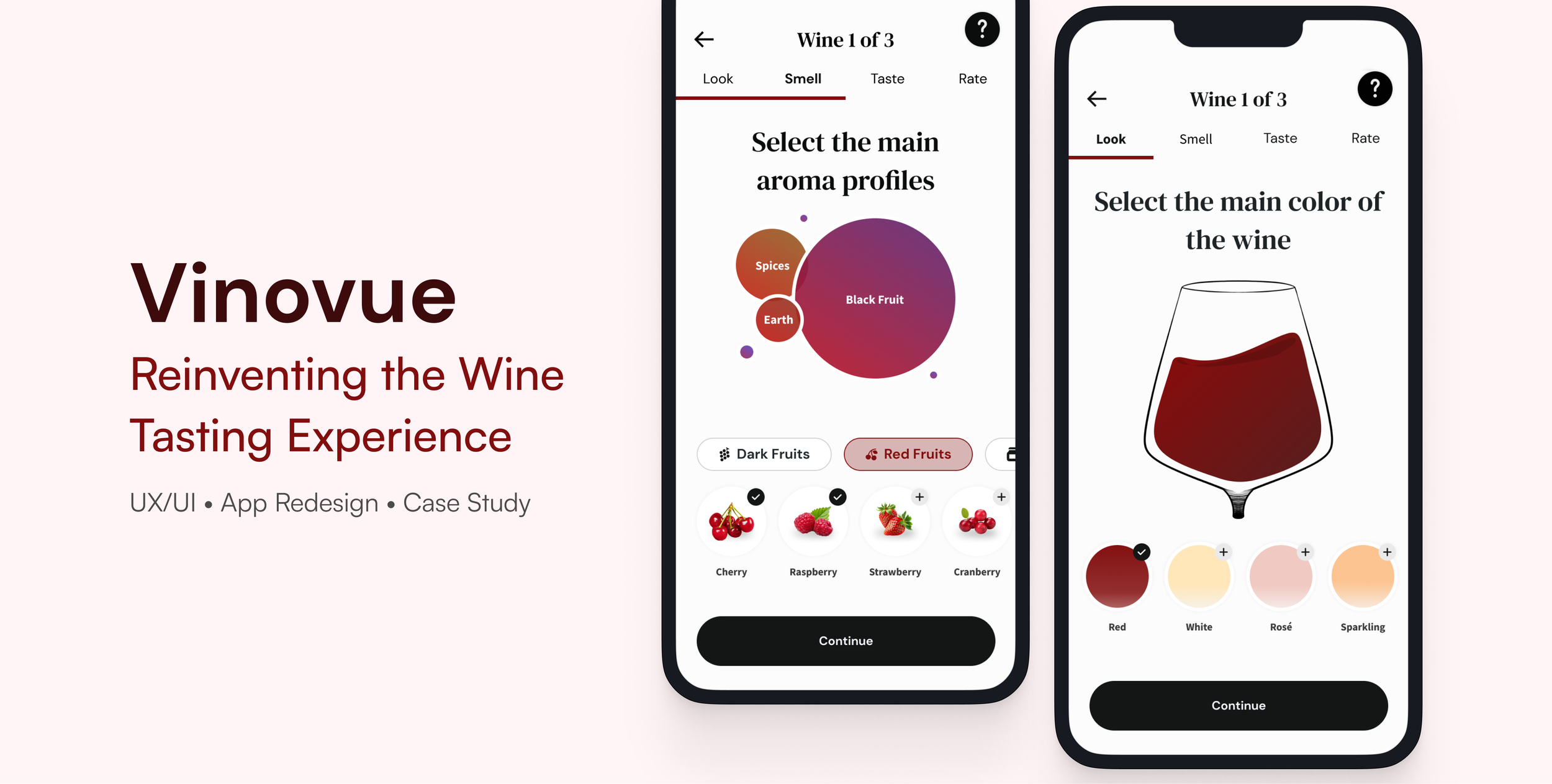
VINOVUE
Reinventing the Wine Tasting Experience
Vinovue (pseudonym) is an all-in-one software solution for wineries, designed to streamline operations, connect with guests, and boost revenue. Their software seamlessly integrate everything from online booking and tasting experiences to sales and loyalty programs.
In this project, we redesigned their wine tasting app experience to boost user engagement through improved visual and interaction design.
ROLES & RESPONSIBILITIES: Research, UX/UI
PROJECT CONTEXT: Contracted Project
TEAM: 3 UX Designers
DURATION: 6 Weeks (Summer 2024)
TOOLS USED: Figma, G Suite, Zoom
PROBLEM
Visitors have varying wine knowledge and want to feel engaged in the tasting.
Not all winery visitors are well-versed in wine, which can hinder their ability to fully appreciate the wine tasting experience. It can also be challenging for the wineries to cater to the specific tastes and preferences of every individual customer due to lack of time per tasting. Furthermore, a lack of properly trained staff can be a barrier for smaller wineries in delivering information about wine effectively.
SOLUTION
Personalize the wine tasting experience and provide interactive feedback.
We designed an app experience that acts as a personal wine tasting assistant guides visitors who are less familiar with wine tasting. For those more experienced, the app is able to improve their engagement through curated features and interactive design. The app offers an immersive, informative journey to enhance understanding and enjoyment of wines.
EXISTING RESEARCH & BUSINESS NEEDS
Establish personalization and connection.
It can be challenging to cater to the specific tastes and preferences of every individual customer due to the sheer amount of guests per wine tasting.
It becomes difficult to spend enough time with customers due to a lack of sufficient time to provide a comprehensive experience to each customer.
Only around 20% of emails are successfully collected during winery visits and tastings, making it challenging to develop brand loyalty and nurture long term customer connections.
COMPETITIVE RESEARCH
USER INTERVIEWS
Our team conducted qualitative interviews to identify wine tasters’ needs and pain points. The user interviews were conducted remotely with a total of 8 interview participants. We curated the interview questions to uncover and understand visitors’ typical wine tasting knowledge, preferences, perspectives, habits, and motivations.
MAIN INSIGHTS
We synthesized our findings using an affinity map and decided to focus on the following:
PERSONALIZE THE EXPERIENCE
Visitors want a wine tasting experience that is tailored to knowledge level and goals for the trip. Some visitors are more keen on acquiring new knowledge on wine, whereas others may simply just want to have a good time.
STREAMLINE DATA COLLECTION
It is both a business and user need that data is collected and stored efficiently. The data collected throughout the wine tasting experience can help visitors make confident purchases and help wineries improve their product.
LESS TEST, MORE FUN
The wine tasting experience should be fun and engaging. Some visitors may feel as though they are being tested through questions in a wine tasting experience and feel bad if they do not select the “correct” answer.
ELIMINATE THE BARRIERS
The app experience should aim to make the wine tasting experience accessible for everyone by eliminating language and knowledge barriers. It should be easy to pick up and to use through the wine tasting, especially if you are holding a glass in the other hand.
USER PERSONAS
We created two personas to represent the two major demographics we wanted to focus on within our designs: the beginner and the expert.
USER FLOW
We began designing the new app experience by first outlining the user flow to align our vision prior to ideating via sketching and lo-fi wireframes.
LO-FI WIREFRAMES
We then explored different ideas through sketches and lo-fi wireframes. Here are our final wireframes and some alternative design explorations.
HI-FI DESIGN EXPLORATION
Each designer on our team drafted our own vision for the high fidelity version of the app before converging as a team. We then met with the Vinovue team to discuss design choices before creating the final version of the app with the best of each concept with the help of their feedback.
KEY FEATURES
FINAL MOCKUPS & PROTOTYPE
CONCLUSION
Things I learned and what I would do next time…
Teamwork makes the dream work.
I had an incredible time with my fellow UX designers on this team coordinating our efforts to perfect our ideas, from research to ideating to prototyping. We overcame a lot of challenges and it was an amazing feeling to zoom out on the file and look back on all of the work we had completed in such a short amount of time. If either of you are reading this, thanks again for a great time! 🤘😁
There’s always more to learn.
Did you know that the color of the wine can be an indicator for its age? This project was initially very intimidating to me as someone who knew nothing about wine or the process of wine tasting, but I was able to learn a lot through our meetings with the client, chatting with my teammates, as well as doing tons of extra research. This experience has taught me that with perseverance and an open mind, every challenge can become opportunities for growth and discovery.
Testing, one, two..?
Due to time constraint, our project wrapped up with us passing our high fidelity prototype onto the client along with a script for user testing. There is still a ton of room of improvement and, if our team had more time, I would have loved to be able to conduct usability testing with our high fidelity prototypes and improve our designs based on user feedback.
Thank you for reading! 📖
If you have any questions for me or about my work, feel free to reach out at lilyfn19@gmail.com.






















